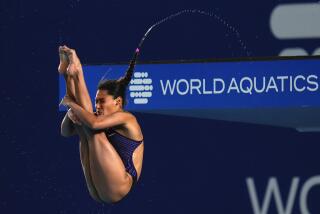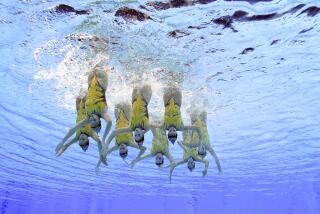1st Woman Construction Diver in Leagues of Her Own
- Share via
PORT HUENEME — Though she is soft-spoken and modest, her crushing, confident handshake betrays her true nature.
As the Navy’s first and only woman underwater-construction diver, Petty Officer Margaret Cooper is part of an elite group of Seabees.
There are only two underwater-construction battalions in the Navy, with just 66 enlisted personnel in each of them.
It is a rigorous, challenging job that requires divers to be mentally tough enough to endure working in icy, murky deep water. They must have the skill to pour concrete, drill and jackhammer underwater. They have to be smart enough to pass difficult physics and medicine exams and strong enough to work with bulky equipment.
Yet, the most difficult part about her job, she said, is leaving her husband, Richard, for seven months when the battalion is deployed.
Cooper, 29, downplays her place in history as the first woman underwater Seabee. Attention, she says, makes her a little uncomfortable. She says she has been too focused on her work and studies to dwell on gender issues and breaking barriers. Her dedication is a natural reflection of doing what she loves, she said.
“I want to show them how I got to where I am and how much work I have put in,” said Cooper, who graduated with honors from the Navy’s Dive School. “I want to show [other women] the desire I have and how they can do the same thing. You gotta have the will.”
As a child, Cooper was a shy, unathletic bookworm, she said--perhaps making her an unlikely candidate for one of the most competitive fields in the Navy. Her father was in the Marines, so her family moved frequently, making it hard for Cooper to maintain friendships.
But the military seed had been planted and Cooper joined the Army Reserves at 16. Within a few years, Cooper’s love of the ocean and interest in building led her from the Army to the Navy.
She first heard about the Seabees at Navy registration, when a colleague inspired her to join. He told her that John Wayne had immortalized a battalion in a movie called “The Fighting Seabees.” Although women were not allowed into Seabee battalions at that time, Cooper said she was confident that would change soon, and it did in 1994.
But Cooper did not want to be just a Seabee. She wanted a bigger challenge--to build and fix things underwater.
“I was always into water,” said Cooper, her blue eyes brightening. “When I heard the possibility I could build, I said, ‘I gotta do it.’ I can’t sit in an office.”
At 5 feet, 9 inches and a solid 149 pounds, Cooper was once known as “Cast Iron” among her colleagues. To prepare for the dive school exam, she trained for a year--swimming, running, cycling, weightlifting and diving. She studied physics and medicine.
Her cast iron will came through when, months before her dive exam, she was diagnosed with a form of cervical cancer. She underwent an operation, got back in shape and took the exams. She graduated with honors and was one of two to pass the medical exam.
“You can’t let something like that stop you,” she said. “That would be an excuse. If you give up, you never know what you’re missing. You try not to let it drag you down.”
With a 70% attrition rate, dive school was the most challenging time of her career, she said.
“Shoot, it was tough to get into the dive school,” she said. “There was a time when I thought I wasn’t going to get in. I remember once I broke down in tears [studying for the medical exam].”
Today, she said, she has softened a bit--her peers now call her “Coop”--but her drive remains the same.
Now a certified Seabee diver, Cooper has traveled to Korea, the Midway Islands and throughout the United States.
Up at 4 a.m., the divers sometimes work until nightfall sinking and raising barges, connecting hoses in offshore petroleum projects and repairing underwater cables.
They brush alongside sharks and seals. They jump into Arctic ice waters where their hands begin to freeze after hours of work.
Sometimes the water is so murky that not even a flashlight helps them find their way. In that situation, they have to memorize a layout of their destination. As they make their way along the depths of the ocean, an officer above directs them through earphones.
They must also be keenly aware of the dangers in diving, such as gas embolism when deadly gas bubbles form in the circulatory tract. The most common affliction among divers is decompression sickness, when they come up too quickly.
But Cooper said she cannot imagine doing anything else. She said she loves the challenges, the pride of building something and the camaraderie.
She said her pillar of support has been her husband of six years, Richard. Richard is sometimes in the position of waiting for his wife to come home.
The separation is hard to cope with, he said.
“It is hard on me, but I think you have to sacrifice some things in order to get the better things--like her, her career and accomplishing her goals,” he said.
She said being a woman has not made things difficult for her in the predominantly male world she lives in.
“I know that when we are working, I’m part of the group,” Cooper said. “There is no question about that. Your life depends on your buddy and his life depends on you.”
Her supervisor agrees, not wanting to make a distinction between her and the other divers.
“Other than she is a female, she is no different than the rest of us,” Chief Petty Officer Paul Patterson said. “If you don’t enjoy [the job], you are not going to last very long.”
Although her world is not tainted by sexism, she said, there is still a long way to go. A self-confessed “Trekkie,” she said she hopes one day the world will be like “Star Trek,” where a person’s color, creed, sex or origin is irrelevant.
“I’m hoping we get to that stage,” Cooper said. “We are working toward it, but we are not there yet.”
For now, Cooper said, she is content with her job. She hesitates to become a supervisor because it means more time in an office rather than in the field.
One day, she said, she would like to have children. “Right now, as far as I can see, I am not getting out [of the military],” Cooper said.
“I like it where I am. But I am kind of looking ahead and seeing what’s there. I like knowing there are other paths I can take.”
More to Read
Sign up for The Wild
We’ll help you find the best places to hike, bike and run, as well as the perfect silent spots for meditation and yoga.
You may occasionally receive promotional content from the Los Angeles Times.






